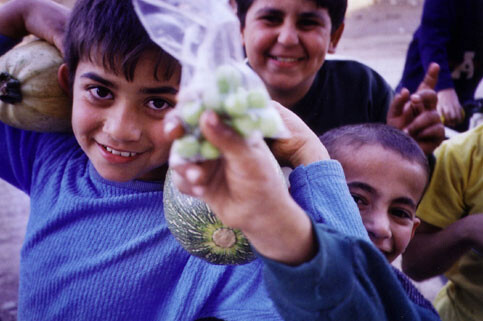Christian Aid 22 December 2003

Palestinian children in Jenin (Photo: Carity Crouse, 2002)
Ahmed Said stands on the rubble of his demolished house, looking out over the wasteland that used to be his farm. He is one of many farmers in Gaza whose land has been bulldozed by Israeli forces since violence between Palestinians and Israelis escalated three years ago.
Much of the land destroyed is near to Israeli settlements. The Israeli authorities argue that keeping the land around the settlements clear enables the security forces to keep watch for potential attacks from Palestinian militants.
Until August 2002, Ahmed made a living for his wife and eight children by cultivating olive and date trees on his three-acre plot in the central region of the Gaza Strip. But one night, following a battle between Palestinian militants and the Israeli army near the Israeli settlement of Kfar Darum which adjoins his land, his house and fields were bulldozed by Israeli forces.
Since then, he has been living in his brother’s house, relying for money on short term job schemes run by the agricultural charity PARC, a Christian Aid partner. ‘I lost my farm and my income,’ he says. ‘The Israelis don’t allow me to cultivate the land and now I have no work.’
Nearby, on land close to a road used by Israeli settlers, Jihad Madi is struggling to re-cultivate his land. Five months ago, his potato fields were churned up by Israeli bulldozers, destroying the irrigation system and the harvest. ‘Before, I had the hope of the harvest’, he says. ‘How can I describe it? Just before you reach your goal, everything is destroyed.’
Jihad used to share the land with his five brothers. The 22-acre plot, an unusually large farm in the urban environment of Gaza, was sufficient to support the sixty people in the six families. Now, with more than half the land destroyed by Israeli forces over the past three years, three of the brothers have given up farming altogether.
Jihad, who has taken on debts in order to rebuild his farm, feels the loss of his relative prosperity keenly. ‘In the past, I was the boss. I had fifty workers. But now I have to work alone in the fields,’ he says.
PARC does what it can to support the farmers. It runs a job creation-scheme which provides Ahmed with a modest salary, paying him to help Jihad rebuild his irrigation system. It has adapted much of its work to the current crisis, meeting the immediate needs of farmers with food relief where necessary.
But there are limits to what the organisation can do. ‘The need is high, especially in land reclamation. We have big areas destroyed totally and many people have been left without resources,’ says Ahmed Sourani, PARC’s director of public relations. He estimates that, in the middle region of Gaza alone, the agricultural losses total $250 million dollars since the beginning of the intifada.
Yet despite the losses, Gaza’s farmers are determined to stay on their land. ‘I want to die on it,’ says Ahmed. ‘This is my native land. I got it from my father and grandfather.’
Related Links: